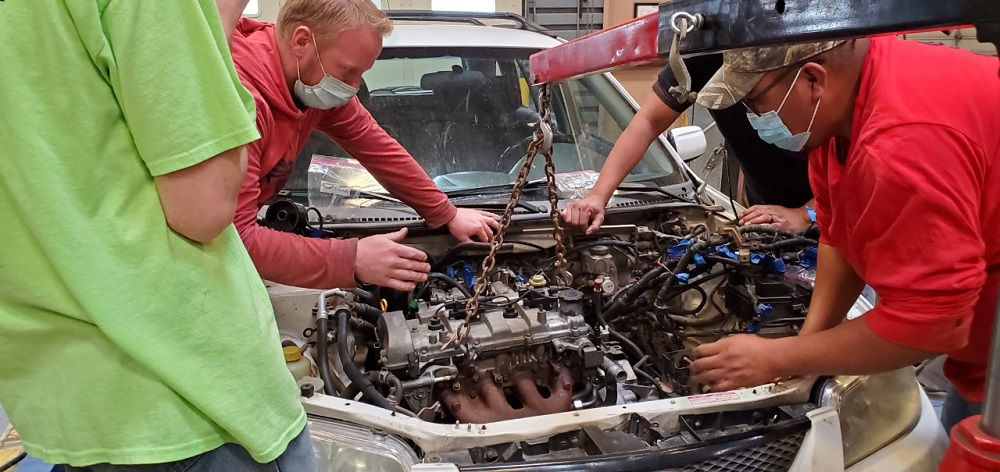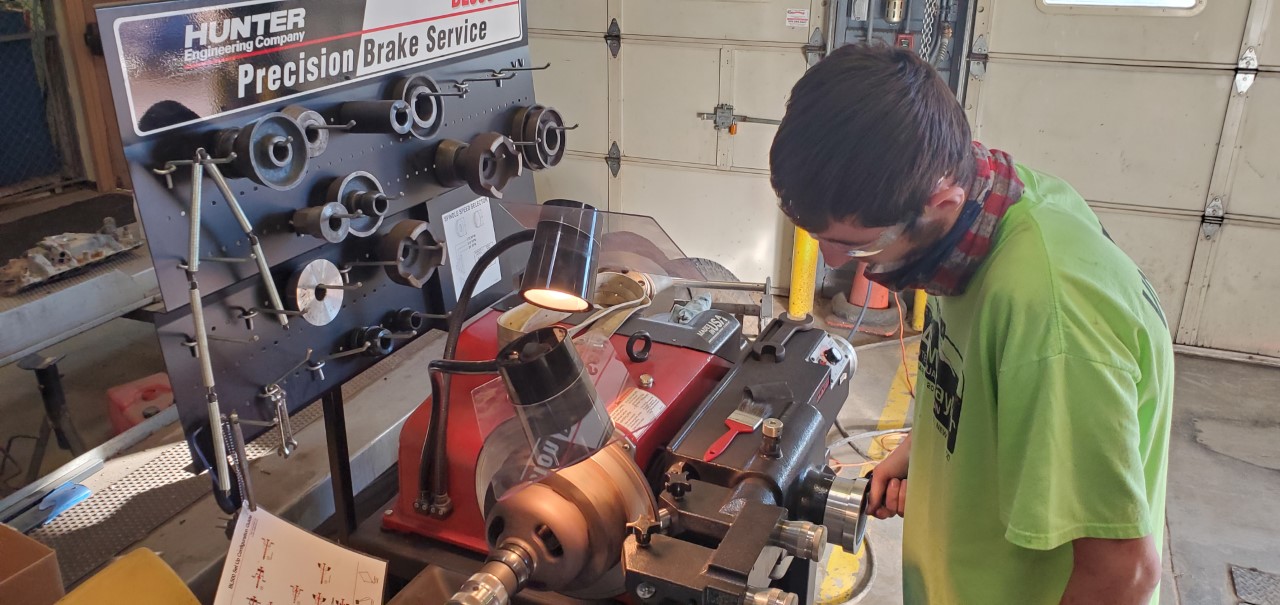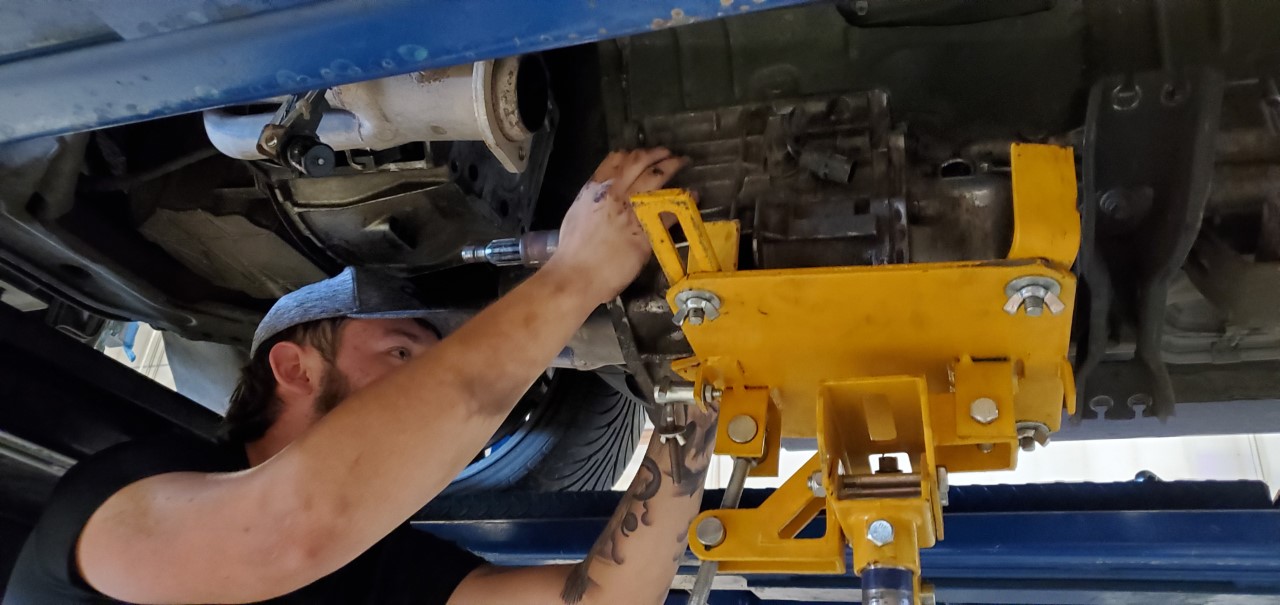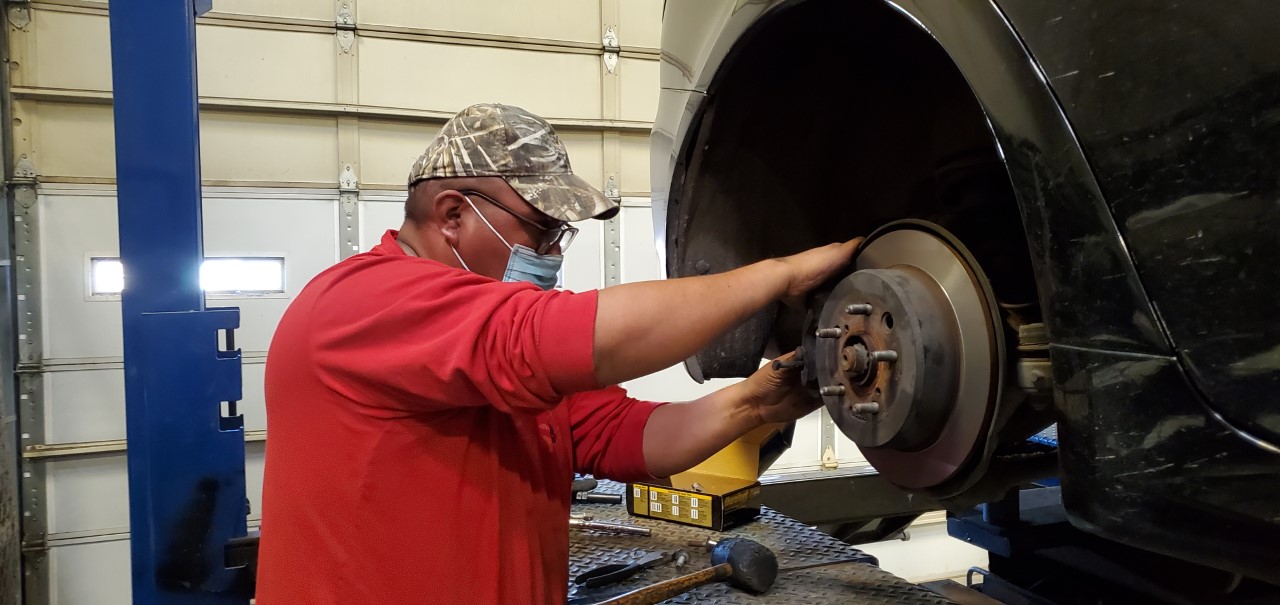About the Program
The Automotive Technology program at NMSU-Grants strives to give students automotive service experience through theory and practical application of skills. The auto service industry requires technicians to not only have tangible skills like rebuilding an engine, but critical thinking skills (applying various physics laws like Hooke’s Law, Pascal’s Law, etc.) as well. NMSU-Grants has the unique ability to have small class sizes, which gives students individualized responses and attention from instructors and faculty members. Students can work to receive an Associate of Applied Science in Automotive Technology, or a Certificate in Automotive Technology. In addition, the program works closely with the Welding Trades program, in an effort to give students the possibility to expand their automotive skills to a welding trades capacity! Students have enjoyed the ease at which their skills can be applied to other trades programs. Students will also work closely with the community by offering their services to those in the surrounding area that request automotive service.
Career Opportunities
Students who complete the Associate of Applied Science – Automotive Technology program are given several benefits if they continue in the career field. The National Institute for Automotive Service Excellence (the leading certification group in the United States for automotive technicians) requires mechanics to gain at least two years of hands on training, however after completing our Associate program, will only require one year of relevant hands on training. This incentivizes students to complete the program, to get as much experience as possible before attempting the ASE certification tests. Students can gain entry level service positions in various automotive capacities such as, dealerships, specialty repair shops, auto part distribution stores, and even aftermarket service shops (custom vehicle shops).
Basic Automotive Maintenance, AUTO 295
Our Basic Automotive Maintenance course gives students the ability to have extra lab time for various projects they wish to work on or complete. We have many students who look to completing larger projects throughout the semester, and use this two-hour lab course to use our facilities and tools.
Basic Gasoline Engine, AUTO 112
Our Basic Gasoline Engine course gives students a workspace to work on overhauling gasoline engines. The course usually requires students to be able to complete a simple rebuild of any engine they like (and can bring for the course), or from our selection of donated engines available. The course will also lecture on topics discussing the mechanical operation of engines, in hopes to give students a better understanding of how internal combustion engines are used in our vehicles today.
Electrical Analysis: Tune Up of Gas Engines, AUTO 117
Electrical Analysis or “Tune Up” of gas engines studies the theories and practical applications of how a gas engine operates. This course correlates with the Engine Performance ASE certification test, and will give students knowledge on basic diagnosis and repair procedures of a vehicle’s fuel delivery system, ignition system, and air induction system. Previous knowledge of electrical circuits and systems is helpful, however not required for course participation. Many students enjoy a course that gives them the basics of how gasoline engines operate, and this course reflects those ideas
Electrical Systems AUTO 120
Our Automotive industry is changing drastically, with the recent push towards electric vehicle systems being more impactful. The electrical systems course looks to give students an introduction to electricity and its theories, and continue towards diagnosis and repair of various electrical systems in a vehicle. Students tend to have more confusion with electrical systems than any other part of a vehicle system, but the safe working environment at NMSU-Grants looks to alleviate some of the common confusion among students in the electrical field.
Brakes, AUTO 125
The braking system on our vehicles is considered to be of the upmost importance. The thought being, "We can't propel our vehicle without an engine, but you can't stop your vehicle without brakes." This course covers every important aspect of braking systems used on various cars, and will give practical experience in diagnosing and repairing braking systems, to keep us and our family/friends safe on the road.
Basic Automatic Transmission, AUTO 127
Nearly every fuel powered vehicle on the road uses an automatic transmission, as its efficiency and minimal invasiveness to the driver allows for a more comfortable driving experience. Our Basic Automatic Transmission course studies the history of how the automatic transmission became as prevalent as it is today, and will allow students the opportunity to overhaul an automatic transmission in an attempt to understand its operation. Students enjoy the ability to remove, disassemble, and reassemble an automatic transmission in an engaging and controlled working environment.
Manual Transmissions and Clutches, AUTO 119
Although a switch in the automotive industry has made manual transmissions less relevant than they are now, there must still be emphasis taken in the understanding of the operation of manual transmissions. Many students enjoy the experience of driving a manual transmission equipped vehicle, and this course requires them to perform a simple overhaul/rebuild of a manual transmission. This gives students hands-on experience with how these systems operate while the instruction given during the course will enable students to utilize the practical knowledge and theories learned for their chosen career field.
Fuel Systems / Emissions Control Systems, AUTO 137
The Fuel Systems and Emissions Controls course follows more in depth concepts and applications first taught in the AUTO 117 Tune Up course. Students who have previously taken the AUTO 117 have noted that some content is reimplemented in our AUTO 137, with more focus being placed on the fuel systems and emissions systems. Students in this course have stated that they like the history involved with how vehicular fuel systems have advanced, and how to diagnose and replace various fuel systems.
Suspension, Steering, and Alignment, AUTO 126
The steering and suspension systems used on vehicles has made many changes throughout history. Anyone who has driven vehicles from the 60s and 70s knows how unresponsive the steering systems can sometimes feel, or how the vehicle "rocks like a boat" due to older suspension systems. This course gives students a comprehensive analysis of how these systems have changed throughout history, as well as the techniques technicians use in the field to diagnose and repair various components in the steering and suspension systems. The course ends with the practical application of alignments, as they are considered to be the overarching concept of steering and suspension systems.



